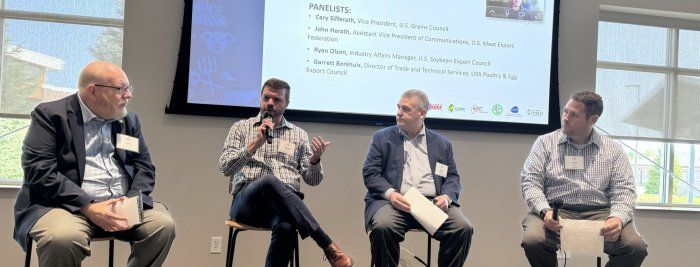Critical Conversations: How Commodity Groups are Looking Towards Future

In an ever-evolving global market, the importance of agricultural commodities coming together has never been more critical. Last Friday, leaders from various commodity groups gathered to discuss trade and policy, a reminder that unity is key to advancing the agricultural sector.
The event kicked off with insights from international and export specialists representing the U.S. Meat Export Federation (USMEF), U.S. Poultry & Egg Export Council (USAPEEC), U.S. Grains Council (USGC), and U.S. Soybean Export Council (USSEC). Their discussions underscored the essential role trade plays in the success of U.S. agriculture. As these experts highlighted, trade is not just a lifeline for commodities but a driver of growth and sustainability.
Later in the morning, Politico International Trade Reporter Gavin Bade provided a timely update on the current political climate and presidential platforms. His insights were a stark reminder of the challenges ahead, particularly in navigating the complexities of international trade in a shifting political landscape.
Dr. Marc Busch, a renowned expert in trade policy, also spoke at the event, emphasizing the critical role of the World Trade Organization (WTO) in supporting agriculture. “Agriculture needs the World Trade Organization (WTO) more than anybody,” he stated, highlighting how vital the WTO is in maintaining fair and open trade for agricultural products. Despite the uncertainties that lie ahead, one truth remains clear—trade is essential for the survival and prosperity of agriculture.
According to Fern’s Ag Insider, “The U.S. food and ag trade deficit will soar to a record $42.5 billion in the fiscal year opening on Oct. 1, fueled by steadily growing consumer demand for imported fresh produce, alcohol, coffee, and sugar, said USDA economists on Tuesday. It would be the third year of largest-ever deficits while export sales, hobbled by the strong dollar, retreat from the record set in fiscal 2022.” Read more on trade deficit from FarmDoc.
Jonathan Coppess from the University of Illinois also addressed the gathering, focusing on the Farm Bill. With the current one-year extension set to expire on Sept. 30, the legislative path forward is uncertain. Passing new legislation requires a series of committee markups, floor votes, and conference agreements before it can be signed by the president. However, with the House on recess and limited time remaining, the chances of completing this process are slim.
“The resounding message from the day was clear: Agriculture must remain on offense, not defense,” stated Matt Rush, Illinois Farmer’s Council President and Illinois farmer from Fairfield, IL. “In a world of increasing challenges and uncertainties, it is crucial that the agricultural community stays united and proactive in shaping the policies and trade agreements that will determine its future.”
Learn how IL Corn is working on the offense.







